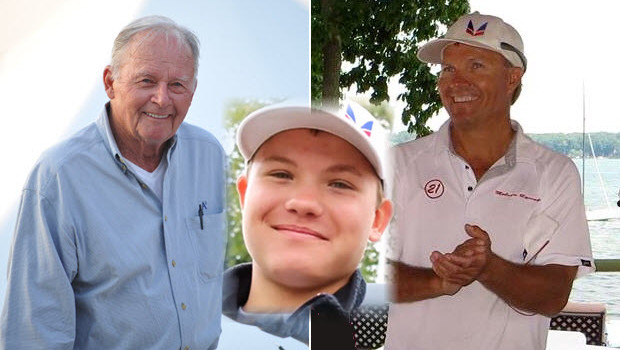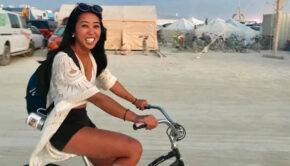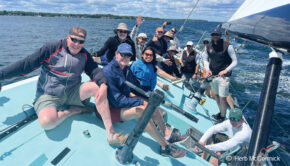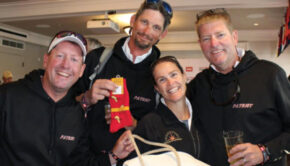Sailing Secrets from Scow Country
Published on August 27th, 2015
In an interview from Seahorse magazine, three generations of the Melges family – Buddy, son Harry III, and Harry’s 14-year old son Harry IV – share their secrets on life, sailing and scow boats…
You guys do a lot of different sports, iceboating, ski racing, motorcross, duck shooting… In terms of preparation is there a common thread?
Harry Melges III: Whatever the sport, make sure your equipment is ready to go. So if it’s skis proper tuning and waxing. On a boat a well-polished hull, good sails and being comfortable with your tune. After that it’s a lot of practice time to get your confidence level up to a point where you’re confident that you can win.
Buddy Melges: And your technical preparation has a big effect on your ‘head’.
Harry Melges IV: Yeh, just keep doing the important stuff over and over again and perfect what you’re doing.
When you are competing against other people your age, what gives you that ‘edge’?
Harry Melges III: Well I like to think that I feel the boat better than other people. I can always predict what the boat’s going to do using the angle of heel and stuff… But I’m still working on that! It’s getting a lot better though.
There’s some secret sauce with Buddy when it comes to angle of heel, yet so many sailors around the world just don’t get that. Buddy you’re really the author of the concept… can you talk about that and how it has translated through your family?
Buddy Melges: Well, the angle of heel thing comes from the scow family of hull shapes. A scow’s got a flat bottom, so it’s two boats in one but you’re only going to use one of them at a time. So now, how much heel do we put into the boat. Also you have to tie that together so that the bilge board is absolutely vertical. Now you take a centreboard boat, and they start to heel too much and they’re immediately going to lose lateral resistance from their plates. Take the bilge boards now and they’re starting to bite at the maximum; and to put water on the deck is ok downwind because we want to slip that way anyway and the heel is going to decrease the wetted surface. Now you take this to any boat, Star boat, America’s Cup boat and all that stuff, you get that feel more quickly by using the scow system of using heel to find the maximum performance you’re going to achieve.
Malcolm Gladwell wrote the popular book Outliers, for which he did his homework and concluded that you’re not able to be an expert at anything until you’ve put about 10,000 hours minimum into doing it. He talked about the Beatles and before they were even big they spent 10,000 hours playing in dive bars in Germany and Liverpool. So talk about practice…
Harry Melges IV: Well during the summer pretty much every day I go sailing with my friends. Sailing by yourself is a little more boring but it can be more serious too. With your friends you can also talk through stuff.
So let’s try to figure out how many thousands of hours each generation has put in at the tiller…
Harry Melges IV: I have absolutely no idea!
Harry Melges III: For sure, way way more than 1,000. I don’t know if it would be close to 10,000. That’s a lot of hours if you do the math. Actually I think the big thing with practice is that you have to love it enough to want to do it enough. And you’ve got to put some variety in it so it’s not mundane. It’s the same with ski racing as it is for sailing. But sailing you’ve got a lot of different great boats to sail. All the scow boats that we build, our new Melges 14, Harry grew up sailing the Bic O’Pen. Now he’s playing around with a Moth and an A Class catamaran. There’s lot of variety in this sport which is fun but it also improves your skills across the board. I believe that if you improve in one boat you also get that much better in another boat.
Buddy Melges: Confidence, confidence, confidence. When you’ve got confidence you win. When you haven’t you get beat.
What’s your favourite boat?
Harry Melges IV: The Moths are a lot of fun. It’s hard to keep up with the boat sometimes. But these days the E Scow is my favourite to sail all round.
Harry Melges III: The E scow is an awesome boat. But I’ve done a lot of Melges 17 sailing with Harry and my daughter Munro now as well. For me, probably the most fun sailing I do is with my kids. The 17 really teaches the kids how to sail; it’s a high performance, apparent wind masthead A sail boat. So to go from the 17 to the E Scow is a piece of cake – Harry actually felt the E Scow was a little easier than the 17. But the 17 creates great drivers.
Buddy Melges: As I said, the scow type of boat does wonders. It drums the angle of heel into you and when you’ve got that down then whole horizons open up. You don’t have to be looking at the numbers up and down and stuff like that. In the America’s Cup we got Bill Koch to buy a scow because we wanted him to become sensitized to the angle of heel so he wouldn’t have to look at the numbers so much and could keep the boat driving in a nice straight line. Early on his track was pretty wide and after sailing the scow it got narrower and narrower. Not only that but the speed wasn’t going up and down like a yoyo either. So there’s a lot to say about being able to feel the boat. Find the angle for every boat you’re going to sail. Now you can present her to Mother Nature and you know before she gets there what’s going to happen. As far as I know, there is no compass yet nor other instrument that tells you what’s going to happen 100yd in front of your boat.
You mentioned confidence. What’s the secret to gaining confidence?
Buddy Melges: Time in the boat is where you get your confidence. You can’t be an Olympic skier going down the hill twice before the event. So you’ve got to do your homework, build your foundation, you can’t have a George Washington Memorial type of tall thin structure, you’ve got to have a nice broad base like a Pyramid. Then you can always fall back on that knowledge. Harry IV will find out, Harry III already knows.
So some lessons learnt listening to dad and Grandpa!
Harry Melges IV: Yeah, every time.
So not yet 10,000 hours but already plenty of confidence. Tell us about going to the E Scow Nationals …
Harry Melges IV: To be honest, going to the Nationals I was just happy to sail the boat where my whole crew was my family… We also had a great regatta. Then we went into the Blue Chip regatta and now I knew I could sail the boat, like quite well I guess.
It was pretty breezy with some good guys like Brian Porter falling over…
Harry Melges IV: That’s what all the Moth sailing, 14 sailing, 17 sailing is about. You get such a good feel for when the puffs are going to hit and what to do, you can just anticipate much better. Your head’s out the boat and you see it coming.
You mentioned the new Melges 14, what’s the goal with that platform?
Harry Melges III: The goal is to be an international one design. Hopefully one day an Olympic class boat. It’s the latest hull design from Reichel-Pugh, with a nice carbon rig and a square top main. It’s a very active sailplan and a really fast fun boat to sail. I think it’s time for something fresh and it’s got a lot of potential
So the son continues in Dad’s footsteps…
Buddy Melges: (Laughing) Footsteps! He passed me long ago. He’s creating his own footsteps. There’s no tracks he’s following. Maybe on a turkey hunt, or maybe a duck hunt, but when it comes to water I think he’s got his own track. He’s not following anybody’s.
What about you Harry, an AC campaign someday or an Olympic campaign…
Harry Melges III: No. I just don’t have the desire. My focus is on our business here and the kids…
Buddy Melges: There’s something to add to what Harry just said. He’ll probably get more thrill out of supplying a boat to somebody here at Cedar Lake Wisconsin and they go out and win when they haven’t won before. And you know we always pride ourselves on helping the customer. They have tuning pamphlets and things like that. Nowadays you don’t just take the boat and go and splash it. You go through everything, you set it up according to the book and the rest is up to you. After that the time in the ship comes out in the silverware.
So back to the business, who’s doing what here these days?
Harry Melges III: Well, Buddy is pretty much retired now. He has his toyshop across town where he gets to work on his iceboat projects. Andy Burdick is now our president. He runs the office and drives sales. I spend most of my time down in the shop, hands on helping to build boats. Then we have Andrew Low, production manager. The Melges 20, 24 and 32 are strong classes and we continue to support those. And all of our scow classes continue to be strong. The last couple of years sales have been really solid in those classes. This year, for example, we have already sold 19 E boats. The 14 is a new project for us and that will soon start to increase in volume. Its good!
It’s a venerable brand and a lot of people around the world respect what this name means. And to have a footprint like that from Zenda Town Wisconsin is something that takes a lot of effort and hard work and discipline. Talk a little about your plans for marketing the new boats…
Harry Melges III: With the 14 we’ll set up dealers around the world plus probably a builder in Europe and a builder in Asia. I think that boat will sell itself pretty quickly. The key is to get it in as many peoples hand as possible. Start throwing regattas and parties (laughs).
Buddy Melges: Build a strong organisation within the class so people can’t fuss with stuff. Don’t get into the situation that some classes are experiencing around the world, where people dick when they shouldn’t be dicking and oughta be driving.
Strict one design is a good recipe for success, plus its owner-driver too eh!
Buddy Melges: True story.
Here you go, I’ve got three kids, 3, 4 and 7 years old. What advice do you have for guys that age so they fall love with sailing, what might a 7 year old or a 4 year old find cool?
Harry Melges IV: For me it’s about keeping up the attention by having fun all the time. Then as you go on it will get more complicated with all the boathandling and tactics and everything like that. And then there’s looking up to someone. I’ve obviously got two great people to look up to in sailing…
Switching to the other end of the generations here, I’d love to understand Buddy what you think would be the best advice that you’ve been able to pass on to your boys… Not just about sailing but also about life.
Buddy Melges: As I look at my own history in sailing, it’s taken me all around the world, I’ve met all sorts of people from all walks of life. There’s a lot of people that are not millionaires that sail boats pretty darned well. So to enjoy people from all over the world and then be able to present a product to them as good as these boats are. That to me is the greatest thing that I can take to the box.
What my father started, what I brought along a little bit. We had some trouble with fires around here, in 1971, when a disgruntled employee had too many matches in his pocket. We got through that, then we transferred into fibreglass from wood construction. And now what Harry has done along with Andrew in building the line here in Zenda with the different class boats and raising performance levels. They got together and went for it; the best example is when Harry purchased our scow competitor Johnson Boatworks and a lot of people thought that quality would go back down. But in this case it turned around and quality went up to even higher standards than what had been seen before. I look back now and that is the biggest achievement that Harry has had so far within the company. To build a quality product and to build a workforce that can deliver that quality day in and day out. That’s tough, but he’s doing it.
What about the evolution of the E scow, you always seem to come out with something a little better each year?
Harry Melges III: Yeah, we’re always trying to make improvements wherever we can. The E scow changed a lot with the A sail and bowsprit; that gave us the excuse to make a new deck mould. But you can still buy an older boat, do some upgrades and you’ll be competitive.
What about bigger boats?
Harry Melges III: We’ve kicked around a 40-footer for a while with Frederico of Melges Itlay. So far it’s just been talk but there is a lot of owner pressure to do it…
Is that about comfort level?
Harry Melges III: Every new class is a little uncomfortable! There’s lot of work and risk involved.
What about foiling?
Harry Melges IV: It’s really cool. Sailing the Moth has given me more of a handle on sailing boats with accentuated sensitivity. But I enjoy the non-foiling boats just as much.
Feel…
Harry Melges IV: In the Moth you can’t move your body much or you slow down. Make a big mistake there and the boat will cartwheel. So focus. Going from there to the E Scow when it’s windy and shifty that experience really helps.
Harry Melges III: The Cup in foilers is cool to watch. Foiling is fun, it’s fun to do but it’s a different kind of racing. Cats will eventually all be foiling, why wouldn’t they? Racing something like a Moth is great but it’s not easy… for high end guys only. And tactics are more like an iceboat race. There’s still a huge need for regular dinghy racing, that’ll never go away.
Buddy Melges: With the foils the Cup’s a track race now. One guy forcing another into a mistake, I don’t think you’ll see much of that. The AC was probably the forerunner to match racing as we know it now. The AC now is a whole different beast. There used to be different ways to get to the line first; when was the last time you saw ten tacks on the windward leg of an AC race?
So tactics are out the window…
Buddy Melges: Speed, that’s what it’s all about now. Last time the Kiwis had it in the bag then the USA learnt how to foil upwind and through manouvers… Maybe my age has got me hooked on tactics and things like that which are more exciting from my point of view. I think the doers like the tactics but the folks up the shore, they’re all about, ‘Whoo, look at it go!’ It’s a bit like iceboating where we do six 10-mile races a day.
So is the new AC product closer to iceboating?
Buddy Melges: Sure, in iceboating the old talk was the harder you sheet the faster you go. A lot is the same. Upwind that’s true and downwind it’s true too. You go round the windward mark and usually you double your speed within 100m. The AC cats look much the same deal.
Fastest top speed you’ve each been at under sail?
Harry Melges III: They clocked us at 130mph here in the late ’80s.
What about iceboating and the next generation?
Harry Melges IV: The ice has been pretty poor the last few winters. But in the Moth I’ve seen maybe 25kt.
Harry Melges III: How about the scow?
Harry Melges IV: 22kt
What’s your goal in the scow for next year?
Harry Melges IV: To beat Brian Porter!
There’s some big stories in the scow fleets…
Buddy Melges: I remember sailing with DC [Dennis Conner]. I was on the jib, the rest of the crew was Melges family. Luck was rolling our way but the third race, it was honking, the jib came on too fast and we flipped her. We got the boat up and gradually recovered various crew who were floating away. Took a while but we still beat a few… Later the fun thing was Mr AC coming in to the finish on port with plenty of pressure. I look over and here comes this black one which I know will be a big lift. Tommy Schweitzer was rolling in on starboard and I look back at DC and there was nervousness all over his face… I told Dennis, “it’s ok were gonna get a big lift”, which we did and we won. To have DC go and do all the great things he’s done. That’s been fun to talk about together, at least in our backyard during cocktails.
Buddy, multiple world titles, Olympic medals, the America’s Cup, what’s been the most gratifying achievement.
Buddy Melges: Marrying Gloria. Gloria’s been the whole reason I got here. She supported me during Olympics, with all the training. The family was growing but she just hung in there and encouraged us.
Early days…
Buddy Melges: Back then the Melges name was just getting out there; and when you travelled people always talked about these funny scow boats that we sail. Now, Harry is doing such a fantastic job since taking over; go back to when I was out playing with Bill Koch, he should have been in college but instead dropped out with his brother and they came back and put themselves through Zenda U. Now they have created a business that stands tall in all areas. I doubt they could have gotten any better education than at Zenda U. That just made Gloria and I the proudest people.
Another note and what changes would you like to see in Seahorse…
Buddy Melges: More scow coverage!!!
It’s been a pretty amazing relationship between our businesses…
Buddy Melges: Yip. I remember Peter [Harken] coming round with his first little black blocks and those little white balls. I put them in my boat, pulled the sheet and nearly went right out the back of the boat… everything was SO light. From that time forward we were together forever. One less appreciated thing about what Peter and Olaf did was to make everyone’s boats so user-friendly. Now the women could get back in the boats again. We had ladies sailing on boats in the 1940s then they disappeared; now they are sailing again.
Favourite bands?
Harry Melges IV: I listen to everything.
Harry Melges III: Jack Johnson, Train.
Buddy Melges: The Green Bay Packers, they play beautiful music every Sunday.
NOTE: This column was re-published with permission from Seahorse magazine (August 2015). Information about Seahorse can be found HERE.









 We’ll keep your information safe.
We’ll keep your information safe.